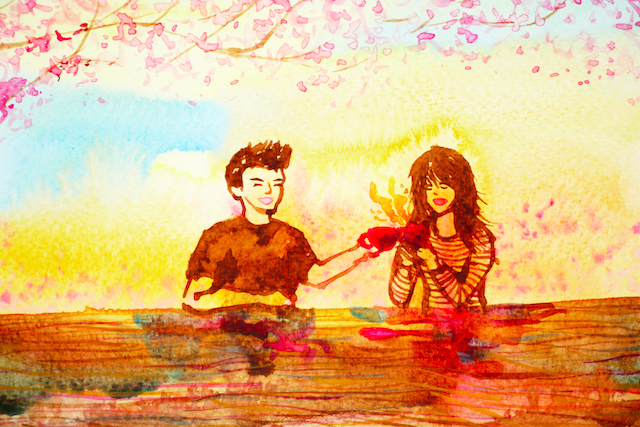
“We can complain because rose bushes have thorns, or rejoice because thorns have roses.” ~Alphonse Karr
“You should have told them. You should have told them you like it. They need to know people are happy there.”
“I know I should have. But I didn’t want to seem insensitive or make anyone feel bad.”
We sat at the dinner table, my boyfriend looking at me, me staring at my cleaned plate. We’d had variations of this conversation before. I tell him my coworkers aren’t happy at work, but I am happy at work, and he is forever confused as to why I’m scared to voice up that I love this job.
Part of the reason for my silence is that I’m the youngest in the office. The pay isn’t very high, but it’s everything my partner and I need right now. I love teaching and working with students. My commute is a twenty-minute walk down a picturesque Main Street.
Obviously, there are times of stress, imposter syndrome, and downright exhaustion. But it’s nothing compared to the fear I formerly felt about not having a job and living 2,000 miles across the country from my boyfriend. Again.
Thus, when my coworkers voice concerns over meager pay and little respect, I usually pretend not to hear them, hunkering in my cubicle. Putting earbuds in with no music. Looking preoccupied with something else.
Their concerns are valid. They have families and decades more work experience than I do. We’re all in different places, which creates the spectrum of job dissatisfaction.
To say that I loved this job, that it’s the best thing that ever happened to me, I feared would alienate me further from coworkers whom I admire and respect. I am the “new kid on the block” as one referred to me, but I desperately wanted to fit in and be one of the faculty members.
I’ve danced this line before, wondering when it’s okay to accept and show joy even when others are not feeling it. How can I be respectful and supportive when I’m happy in others’ sadness? Rather than helping them off the ground, isn’t that throwing sand on their faces and walking away? What about empathy?
My partner, a skilled outdoorsman who asserts the only emotions he feels are laughter and hunger, said it simply: “You can help them if you tell them the truth.”
I’ve thought about the people who inspire me the most. The people who seem to overcome every odd: being the first in the family to graduate high school and college, finishing a Ph.D. while working full-time and raising two kids, and leading the fight against cancer when it took her mom’s life.
Knowing that other people have faced hard circumstances and still find joy is inspiring. It’s realizing that you can turn around from the desert you’ve been staring at to instead view a mountainside of purple wildflowers. Other people’s strength gives us strength. This is what my boyfriend meant when he said, “you can help them.”
More than finding happiness, intentionally looking for joy and reminding ourselves of the good things is an act of bravery. Sharing joy is an act of bravery.
We don’t have to look hard to find culturally affirming messages that work should be hard. That we should hate our jobs. That getting older sucks. That something other than the present moment is “the good old times.” And of course, that life itself is just plain hard. It’s easy to feel jealous. It’s easy to ignore what would have made us happy years ago.
That’s easy. Creating joy for yourself is hard. So, let’s all do the hard thing.
I don’t have the balance between empathy and joy figured out. One of my fears is still being insensitive to others’ pain. But I have come to realize this from more conversations and reflection on my heroes: We help others more than we hurt them when we share our joy.
We open possibilities for people when they see happiness. Gratitude. Presence. Acceptance.
As one example, my grandpa passed away last April. Grandpa was the glue and epicenter of our family. His spontaneous jokes, wide smile, and contagious laugh will always be missed by everyone who knew him.
He and my grandma had been married for nearly seventy years. The grief is still raw for her; she talks to him every day. But she chooses to keep living fully, saying, “I wake up every day, and I think to myself: Am I going to be happy today? Am I going to be sad? And I choose to be happy.”
It’s not that my grandma doesn’t miss my grandpa. Her bravery to choose happiness doesn’t dilute anyone else’s pain. Instead, it lives out the legacy of a joyous man and gives strength to his children and grandchildren. It opens the possibility that we can be happy. Simply put, her joy helps us.
Below are three thoughts I’ve returned to when faced with the question of day-to-day living: Will I choose joy? Will I share it with others?
I choose to…
1. Make the best out of this situation.
In college, my roommate came up with ideas for dance parties while she was studying for cellular biology. The idea was simple: study hard for something you don’t really want to be studying at all, and take a five-minute break to dance like an idiot to a 2000s pop song. Occasionally, the folks below you might yell through the vents. But the point is, you make the best of something you don’t want to do.
I’m forever thankful that my roommate taught me this and then demanded I join in. She taught me that whatever’s going on, we can make it fun. We can make a boring trip to Walmart fun by blasting music, we can make working out fun by making all our friends go with us at 7am, and we can make studying fun by sipping a new flavor of herbal tea with each biology chapter.
We can all apply this to our lives. Choose music that makes you happy while driving to run errands. Look at clouds and trees and other things that bring you joy. Make up stories. Even just stopping to tell yourself, “I will make the best out of this. I will make this fun for me,” will consciously remind you to make life fun for yourself.
I choose to…
2. Acknowledge and accept all emotions—feelings of anger, hurt, boredom, jealousy, not-good-enoughness, sadness, and loneliness.
Though I choose to see the good in everything, that doesn’t mean avoiding pain. I want to feel it so I can help others through it. I don’t want anyone to feel alone, and that starts with acknowledging that each of us has feelings we don’t want to feel. When we feel them, we get a little braver. It’s easier to ignore them. It’s a whole lot harder to acknowledge they’re there, and to accept them.
One simple thought to say to yourself, “I will be real with myself. I will be brave enough to feel this, so at the very least I can help someone else walk through this.”
I choose to…
3. Focus on everything that’s going right rather than what’s going wrong.
It’s easy to find problems with everything. One professor told me, “Everyone can find problems. You can be the one guy to find solutions.” And it’s true. Would you rather be a problem-finder or a solution-maker?
My default setting seems to be anxiety and problem-finding. I can find anything to be stressed about, anytime of the day, anywhere.
It takes more work for me to intentionally think about what’s going well. So, one strategy I like to use is the negative game (this especially works for me because I’m a great worrier).
What would it be like if my boyfriend left? I’m so glad to have a partner here day-in-and-day-out who loves me (and tells me that every day), who cooks well, and sincerely loves cats.
What would it be like if I didn’t have a job? I’m so glad I have the opportunity to work with students each day and to help them reach their goals.
What would it be like if my parents weren’t here? I’m so glad to have parents I can call every day and who truly care about me, who would fly across the country to see me, who listen attentively to every student-story I share.
Who wouldn’t relax a bit after playing this mind game? Choose to think about what you can do; what you do have. Even the basics are grounding: having nutritious food to eat, clean water to drink, a safe home to live in.
I did end up telling my coworkers that I enjoy this job after one of them shared they’re planning to leave after the next school year. I offered up a tentative, “I like this job. It works great for me right now.” No one threw rocks or kicked me out. They agreed it was great for someone just starting their career.
Don’t be afraid to share your joy, even if other people don’t share it. Who knows, you never know how you can help someone. Maybe my brief words helped my coworker find something positive in our workplace.
I leave you with one quote:
“Never dull your shine for someone else.”
Help other people see joy, and be brave enough to practice it.
About Anonymous
This author is an English teacher at a public university. After battling and surviving anorexia, she finds well-being through yoga and writing and encourages others to do the same. Words can heal.













 Though I run this site, it is not mine. It's ours. It's not about me. It's about us. Your stories and your wisdom are just as meaningful as mine.
Though I run this site, it is not mine. It's ours. It's not about me. It's about us. Your stories and your wisdom are just as meaningful as mine. 